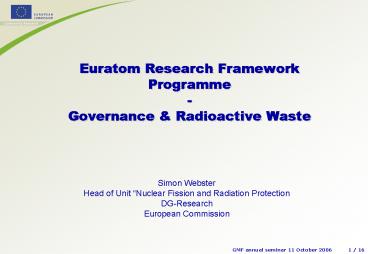Euratom Research Framework Programme Governance - PowerPoint PPT Presentation
1 / 16
Title:
Euratom Research Framework Programme Governance
Description:
The driving force in transparency is understanding and clarification this is ... and apply approaches to transparency and participation using especially ... – PowerPoint PPT presentation
Number of Views:29
Avg rating:3.0/5.0
Title: Euratom Research Framework Programme Governance
1
Euratom Research Framework Programme-Governance
Radioactive Waste
Simon WebsterHead of Unit Nuclear Fission and
Radiation ProtectionDG-ResearchEuropean
Commission
2
Overview
- Euratom and EC programmes - overview
- Euratom support to RD in the field of radwaste
management - Research in the field of radwaste governance
- Past projects
- Current and future projects
- Conclusions
3
Euratom vs. EC programmes
Billion
5 years!
7 years!
EURATOM
EC
4
Euratom programmebudget breakdown
Million
4 years
5 years!
5
Current major FP6 projects on geological disposal
6
Basis for support to research on governance
- societal and governance issues recognised as
being crucial in the development of geological
disposal options - In Euratom FP5, societal aspects introduced for
first time as a research field under theme of
radwaste management - In FP6, under theme geological disposal
- research is also needed to develop decision
processes that are perceived as fair and
equitable by the stakeholders involved - development and evaluation of better governance
processes that properly address public concerns
on waste disposal. - Governance aspects also in scope of Euratom FP7
7
Euratom governance projects
- Governance projects under Euratom FP5
- RISCOM-II Risk Communication
- COWAM Community Waste Management
- TRUSTNET inclusive governance
- Governance projects under Euratom FP6
- COWAM-2 Community Waste Management
- ARGONA Arenas for Risk Governance
- CIP COWAM In Practice
- OBRA European Observatory for Long-term
Governance on Radioactive Waste Management
completed
on-going
imminent
8
The RISCOM model how to make a technical
subject more transparent?
Truth/efficiency - Objective world - Scientific
methods and technology Are we doing things
right?
The driving force in transparency is
understanding and clarification this is through
communicative action
Are we doing theright thing?
- Authenticity
- - Personal integrity organisational identity
- Are we doing what we say?
Legitimacy - Social world - Is this right and
fair?
9
COWAM local communities
Experts
Local actors
Implementers
7
18
65
10
Public authorities
230 participants
10
COWAM vs. RISCOM
- COWAM
- 3-yr collective learning process
- Emphasis on local dimension
- Networking at local level and between official
stakeholders - Forum for reflection without confrontation
- Practical examples of citizen engagement
sharing experience - RISCOM
- Theoretical model to analyse aspects of decision
making in radwaste management - Test of applicability of this model
- Covered PA, citizen participation, organisational
aspects - Both emphasise that problem is not purely
technical. Wider stakeholder concerns must be
addressed. The decision-making process must be
open, transparent, fair, participatory
11
COWAM-2 Community Waste Management - 2
- Builds on an important base provided by the
community networking in first COWAM - The COWAM name is now well known and becoming a
byword for local stakeholder participation - Many of the recent developments in MS in this
field have the COWAM fingerprint
12
ARGONA
- Effective risk governance through implementation
of transparency and participatory methods,
involving - analysis of the three arenas of (i) transparency
(RISCOM Model), (ii) deliberation, and (iii)
representative democracy - analysis of role played by mediators
- important risk communication element
- SE, FI, CZ, SK, UK
- Combines research in social psychology with a
more technical approach. Will test and apply
approaches to transparency and participation
using especially RISCOM model. Will also look at
the challenges of governance after site selection.
13
CIP
- Assessment of ongoing processes in 5 Member
States (France, Romania, Slovenia, Spain, UK)
through two interrelated activities - National Stakeholder Group (NSG) will review,
from a local perspective, the inclusive
governance approaches developed in their country,
and elaborate a Prospective Case Study. - Based on the national reviews, a core group of
experts will draw lessons and bring out EU-level
guidelines for inclusive governance of
radioactive waste management.
14
OBRA
- OBRA will contribute to better governance of
radwaste by providing mechanisms for all
stakeholders to have access to knowledge
generated by successive EU research programmes - knowledge resides not only in published material,
but also in the experience of experts. - most appropriate forms of interaction with
experts will be identified and promoted - will provide feedback on best practice regarding
how RD and education / training in radioactive
waste is formulated and managed - close interaction among the different
stakeholders is necessary to build up trust and
create a critical mass
15
Overview of new governance projects
- Total Euratom FP6 funding 2.3M
- Projects will be clustered and will build on
past and current actions - Contracts negotiated to ensure complementarity
and avoid overlap - Regular newsletter, common Web portal, common
annual meeting, exchange of reports - Resulting guidance should be harmonised and must
be practicable, pragmatic and respond to the
Euratom programme objectives - Important synergies with other forums and
experience, e.g. FSC, EC programme Science
Society
16
Conclusions
- This is soft science, but not with soft
impacts - Strong synergies with decision making for other
controversial projects and with the EIA process - Key objective is to facilitate real progress
towards deployment of the geological disposal
option - However, situation varies from country to country
no one size fits all (e.g. issue of
retrievability) and must be wary about
backfitting solutions / decision-making processes

